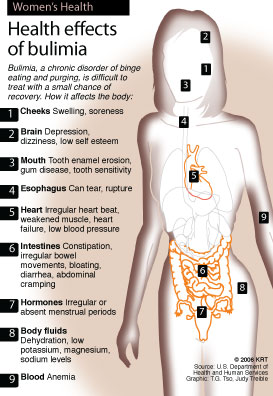 MCT Campus
MCT CampusWhile many of us associate eating disorders with skeleton-thin women, it is important to note that males as well as females are affected by these extremely harmful disorders and not everyone with an eating disorder is skinny. It’s also important to remember that one of the most common features of an eating disorder is denial 8212; from the affected person, and from the surrounding friends and family.
The National Eating Disorders Association provides the following valuable information on the causes, characteristics, prevention and treatment of eating disorders. Looking at the signs and symptoms of the different disorders may help you recognize whether you or a friend may have an eating disorder. The sooner an eating disorder is diagnosed, or acknowledged, the easier it will be to treat. Prevention is key, as once a person has developed an eating disorder; it can spiral into a very serious, life-threatening illness.
Anorexia Nervosa
If you or someone you love has recently lost a lot of weight, or is very thin, they might be anorexic. Other signs to watch out for are constant thoughts and talk about calories, body weight, image, and food. A person with anorexia may talk about being really fat, despite the fact they are quite thin.
Avoidance of social occasions, especially those involving food is another sign to watch out for as well. Someone with anorexia may decline any invitation to go out to eat with friends and if they do accept, they may have a tendency to play with the food on their plate, or even covertly spit un-swallowed food into a napkin.
Bulimia Nervosa
Usually someone who is bulimic recognizes these unhealthy patterns as an eating disorder, though friends and family may have no clue, as it is not uncommon for those suffering from bulimia to be of a healthy body weight.
Warning signs for bulimia may include; regular trips to the bathroom after eating, swelling in the jaw and cheeks, calluses or nicks on the back of hands and knuckles, and large portions of food disappearing, or many empty food packaging in the trash.
People with both anorexia and bulimia tend to withdraw from friends and usual activities, exercise compulsively and exhibit signs that their primary concerns in life revolve around losing weight and controlling food.
Binge Eating Disorder
Binge eating disorder can be described as often consuming large amounts of food very quickly. If you have this type of eating disorder, you may eat even though you aren’t hungry, eat in secret and experience serious weight gain.
If you think you or a friend may be suffering from an eating disorder, intervention is necessary. It may be hard to recognize that you have a problem, or to tell a friend you are worried about them, and you may encounter resistance in the form or denial or defensiveness. But giving and receiving help is a sign of love for your friend or yourself.
If you aren’t ready to confront your friend head on, ask someone you trust for advice. Always remember there are many resources available such as Student Health Services, websites like www.nationaleatingdisorders.org, books and hotlines, 1-800-931-2237.






